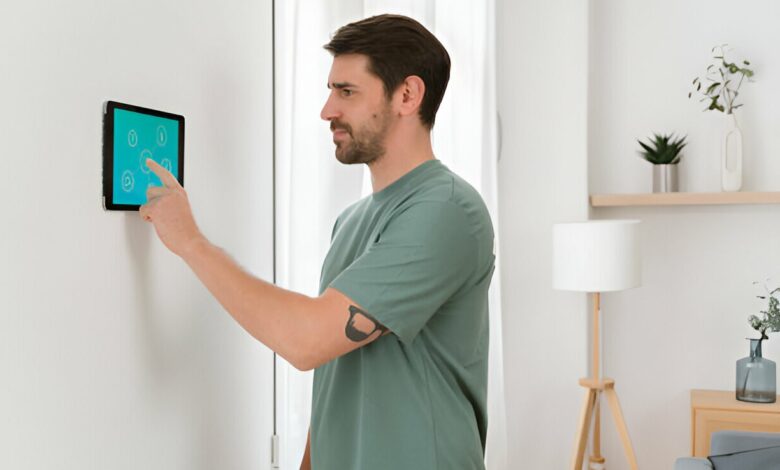
The evolution of technology has revolutionized nearly every aspect of daily life, and one area where this change is most apparent is in home automation. Smart homes are rapidly becoming a key part of modern living, with an increasing number of individuals and families in Spain adopting intelligent systems to enhance convenience, security, energy efficiency, and comfort. As we look ahead, the future of smart homes in Spain is shaping up to be even more dynamic and innovative, as advances in AI, IoT, and energy-efficient solutions continue to transform the home environment. In this article, we will explore the current trends and emerging innovations that are set to define the future of smart homes in Spain.
1. The Rise of IoT (Internet of Things) in Smart Homes
The Internet of Things (IoT) is at the heart of smart home technology. It refers to the network of physical devices, vehicles, appliances, and other objects embedded with sensors and software, which enables them to connect and exchange data over the internet. In Spain, the adoption of IoT in homes is accelerating, and it’s reshaping how homeowners interact with their living spaces.
In the future of smart homes in Spain, IoT will continue to be a key enabler, allowing for seamless integration between various devices and creating interconnected systems that make homes smarter. Smart refrigerators, lighting systems, thermostats, and even household security cameras will work together to ensure efficiency and convenience. This ecosystem will allow homeowners to control and monitor their entire home remotely via their smartphones or voice-activated assistants, such as Amazon Alexa or Google Assistant.
2. Increased Focus on Energy Efficiency
One of the main advantages of smart homes is the potential for energy savings. The future of smart homes in Spain will likely place a stronger emphasis on energy efficiency, driven by both environmental concerns and economic benefits. As Spain continues to move toward its renewable energy goals, homeowners are increasingly seeking ways to reduce energy consumption.
Smart thermostats, energy-efficient lighting, and automated systems that regulate heating, cooling, and lighting based on occupancy and time of day are becoming standard features in modern homes. In the future, Spain’s smart homes will incorporate even more advanced energy-saving technologies. Solar panels, smart grids, and energy storage solutions will work together to create homes that are not only more energy-efficient but also self-sufficient.
Additionally, smart home devices will be able to provide real-time feedback on energy usage, helping homeowners identify areas where they can improve efficiency. With the increasing awareness of sustainability and green energy solutions, Spain will likely see a rise in the integration of smart home technology with eco-friendly practices.
3. Integration of AI for Personalized Home Automation
Artificial intelligence (AI) is transforming the future of smart homes in Spain, allowing for highly personalized and intuitive experiences. AI-powered devices are becoming more capable of learning from user behavior and adapting to preferences over time.
For instance, smart lighting systems can adjust based on your daily routine, while smart thermostats will learn your temperature preferences and create a customized heating and cooling schedule. Voice assistants, such as Siri, Alexa, and Google Assistant, will continue to evolve, offering more natural conversations and advanced control options for various home systems.
Moreover, AI can enhance the security of smart homes by using facial recognition, analyzing data from security cameras, and even predicting unusual activity. These AI-driven systems will make homes safer, more comfortable, and efficient, and they will be integral to the future of smart homes in Spain.
4. Smart Home Security: A Growing Priority
As smart homes become more connected, the demand for advanced security systems will increase. The future of smart homes in Spain will feature highly sophisticated security technologies designed to protect against cyber threats and physical intrusions.
Smart home security systems are already popular in Spain, with many homeowners investing in cameras, doorbell systems, and sensors that provide real-time monitoring and notifications. However, future innovations will make these systems even more effective. For example, smart locks will offer biometric features, such as fingerprint scanning, for enhanced security. Additionally, AI-based systems will be able to detect unusual movements or behaviors, alerting homeowners to potential security breaches before they occur.
Cybersecurity will also become a priority as more devices are connected to the internet. Manufacturers will implement stronger encryption protocols and multi-factor authentication to safeguard data and ensure privacy.
5. Voice-Activated Technology and Control Systems
Voice-activated technology is already a significant part of the smart home landscape, and its role will only grow in the future. Voice assistants, like Alexa and Google Assistant, allow users to control various devices, from lights to security cameras, with simple voice commands. In the future of smart homes in Spain, voice control will become even more advanced and intuitive.
In the coming years, Spanish homeowners can expect to see even more sophisticated voice assistants that not only respond to commands but also anticipate needs. For example, AI-powered voice assistants could adjust the temperature based on the weather forecast or suggest energy-saving tips based on historical usage patterns. The integration of voice-activated technology into everyday routines will make managing smart homes more seamless and user-friendly, even for those with limited technical knowledge.
6. Smart Kitchens: The Next Frontier
The kitchen is a critical space in any home, and it’s no surprise that smart kitchen technology is becoming increasingly popular. In Spain, smart kitchens will be at the forefront of innovation in the future of smart homes. Expect to see advanced appliances like refrigerators that can monitor food inventory, suggest recipes based on what you have, and even make grocery lists for you.
Smart ovens and stoves will enable remote control, allowing users to preheat their appliances or monitor cooking progress via smartphone apps. Additionally, AI-driven systems will analyze cooking preferences, helping to create customized cooking experiences. These innovations will make daily cooking tasks more efficient and enjoyable, as well as contribute to energy savings.
7. Smart Healthcare and Aging in Place
As the population in Spain continues to age, there is a growing demand for smart technologies that help seniors live independently and safely. Smart healthcare solutions are becoming a crucial part of the future of smart homes in Spain, allowing older adults to age in place comfortably.
Innovations such as health monitoring systems, fall detection sensors, and voice-activated devices that can connect users to emergency services are becoming more common. Additionally, AI-powered systems will be able to detect health patterns, such as irregular heartbeats or changes in activity levels, and provide alerts to caregivers or family members. These technologies will improve the quality of life for elderly residents while ensuring their safety and well-being.
8. 5G Connectivity and Its Impact on Smart Homes
The rollout of 5G technology will have a significant impact on the future of smart homes in Spain. With its faster speeds and lower latency, 5G will enable smoother and more reliable communication between devices, which is essential for the seamless operation of smart home systems.
The enhanced connectivity provided by 5G will also enable real-time data processing and more advanced features in smart home devices. For example, smart surveillance cameras will be able to stream high-definition video with minimal lag, and smart appliances will be able to communicate more efficiently with each other. The future of smart homes in Spain will be defined by faster, more reliable networks that facilitate the integration of an even broader range of connected devices.
9. Sustainability and Green Smart Homes
With growing concerns about climate change and environmental sustainability, the future of smart homes in Spain will place a strong emphasis on green technologies. Smart homes will increasingly be designed with sustainability in mind, integrating energy-efficient systems, renewable energy sources, and eco-friendly materials.
For example, homes will feature advanced solar panels, energy storage systems, and smart grid technology to reduce reliance on fossil fuels. Moreover, smart water management systems will help homeowners conserve water by detecting leaks and optimizing usage based on weather conditions. As Spain continues to push for greener initiatives, smart homes will play a pivotal role in achieving sustainability goals.
Conclusion
The future of smart homes in Spain is undoubtedly exciting, with new trends and innovations that promise to make homes more intelligent, energy-efficient, and secure. As IoT, AI, and advanced technologies continue to evolve, Spanish homeowners can expect to see greater personalization, seamless automation, and enhanced control over their living spaces. Whether it’s optimizing energy usage, improving security, or embracing sustainability, the smart home revolution in Spain is just beginning, and the potential for innovation is limitless.
By staying on top of these trends and innovations, Spanish homeowners can look forward to smarter, more efficient homes that offer unparalleled convenience and comfort for years to come.











